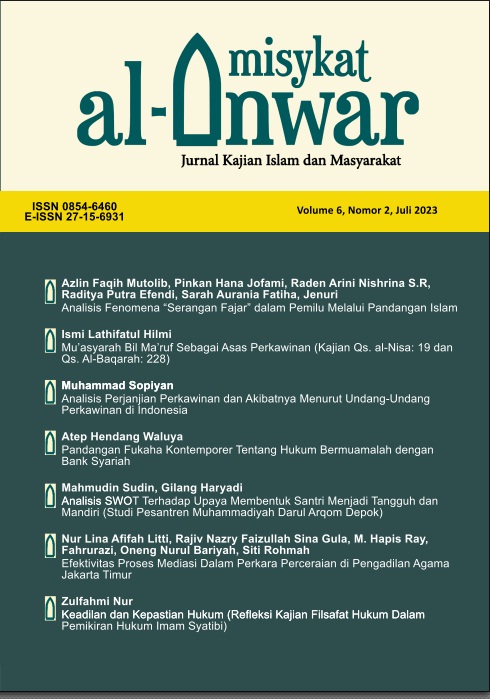Efektivitas Proses Mediasi Dalam Perkara Perceraian Di Pengadilan Agama Jakarta Timur
Main Article Content
Abstract
Article Details
All manuscripts published in the Misykat al-Anwar Journal of Islamic Studies and Society are entirely the property of the author, as for the entry and unpublished script of the journal, the copyright is wholly the property of the author.
All manuscripts published in the Misykat al-Anwar Journal of Islamic Studies and Society are open to the public by following the provisions of the CC-BY-NC-SA (Attribution Non Commercial Share Alike) platform where everyone is allowed and permitted to adapt, the results of the study with the provision should provide citation credit to the author (citation) not for commercial purposes, and one must make a similar provision to the results of his research.
---
Semua naskah yang diterbitkan dalam Misykat al-Anwar Jurnal Kajian Islam dan Masyarakat sepenuhnya menjadi hak milik penulis, adapun naskah yang masuk dan belum diterbitkan oleh jurnal, hak cipta sepenuhnya milik penulis.
Semua naskah yang diterbitkan dalam Misykat al-Anwar Jurnal Kajian Islam dan Masyarakat terbuka untuk umum (open access) dengan mengikuti ketentuan platform CC-BY-NC-SA (Attribution Non Commercial Share Alike) semua orang diperbolehkan untuk menyadur, merujuk dan mengadaptasi tulisan/hasil penelitian dengan ketentuan harus memberikan kredit rujukan kepada penulis (citation) bukan untuk kepentingan komersial, dan seseorang harus melakukan ketentuan yang serupa terhadap hasil penelitiannya.
References
Abbas, Syahrizal (2011). Mediasi dalam Hukum Syariah, Hukum Adat, dan Hukum Nasional,
Jakarta: Kencana Prenada Media Group
Departemen Agama R.I, Al-Qur’an dan Terjemahnya, 2010. Bandung: Penerbit Jabal
Echols, Jhon M. dan Hassan Shadily (1996). Kamus Inggris Indonesia, cet. XXIII. Jakarta:
Gramedia Pustaka Utama
Hakim, Nurul. Efektivitas Pelaksanaan Sistem Arbitrase dan Alternatif Penyelasaian
Sengketa Dalam Hubungannya dengan Lembaga Peradilan,
Http://badileg.net/data/ARTIKEL/efekktivitas.pdf, Artikel diakses pada tanggal 09 Juni
Handoko, T. Hani. Manajemen, (1998). Yogyakarta: BPFE. Cet. II
Head, John W. (2006). Pengantar Umum Hukum Ekonomi. Jakarta: Gramedia Pustaka
Utama
Ketua Mahkamah Agung Republik Indonesia, Peraturan Mahkamah Agung Nomor 1 tahun
tentang Prosedur Mediasi Pengadilan.
Marbun, B.N. (2006). Kamus Hukum Indonesia. Jakarta: Sinar Harapaan. Cet.I
Mulyana, E. (2004). Manajemen Berbasis Sekolah, Konsep Strategi dan Implementasi
Jakarta: PT Rosyda Karya,
PERMA No. 1 Tahun 2008 Tentang Prosedur Mediasi di Pengadilan.
Siddiki, Mediasi di Pengadiln dan Asas Peradilan Sederhana, Cepat dan Biaya Ringan,
dalam, http://www.badilag.net/artikel/mediasi.pdf, Artikel diakses pada tanggal 09 Juni
Soekanto, Soerjono. (2007). Faktor-faktor yang Memperngaruhi Penegakan Hukum. Jakarta:
Raja Grafindo Persada
Sumaryadi, (2005). Efektivitas Implementasi Kebijakan Otonomi Daerah. Bandung: Pustaka
Setia
Sutiyoso, Bambang. (2008). Hukum Arbitrase dan Alternatif Penyelasaian Sengketa,
Yogyakarta: gama Media
Usman, Rachmadi. (2003). Penyelesaian Sengketa di Luar Pengadilan. Bandung: PT Aditya
Bakri
Witanto, D.Y. (2010). Hukum Acara Mediasi: Dalam Perkara Perdata di Lingkungan
Peradilan Umum dan Peradilan Agama Menurut PERMA Nomor 1 Tahun 2008
Tentang Prosedur Mediasi di Pegadilan. Bandung: Alfabeta. Cet.I
